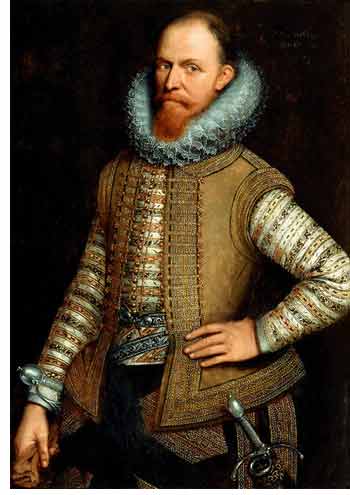 History of Holland
History of HollandHistory of Netherlands
Amsterdam Holland
Netherlands cities
Tulips of Holland
Dutch painters
Dutch writers and scientists
Dutch paintings
Famous Dutch people
Cornelis Corneliszoon
Desiderius Erasmus
Hugo Grotius
Jan Luyken
Jan Steen
Jan Vermeer
Johan van Oldenbarnevelt
Maurice of Nassau<
Michiel de Ruyter
Rembrandt Harmensz van Rijn
Thomas a Kempis
Willem the Prince of Orange
Dutch history
Dutch folk tales
Rembrandt and the Nightwatch
Holland history
Holland on sea history
Pictures of Holland
Dutch architecture
Holland facts
New Amsterdam history (New York)
Useful information
Maurice of Nassau
 Maurice of Nassau (Maurits van Nassau) was born on 14 November 1567 as son of Willem of Nassau and Princess Anna of Saxony, at the castle of Dillenburg (Germany). Maurice was raised in Dillenburg by his uncle Johan of Nassau (Jan the Old), lateron his life he studied in Heidelberg (Germany) and in Leiden.
Maurice of Nassau (Maurits van Nassau) was born on 14 November 1567 as son of Willem of Nassau and Princess Anna of Saxony, at the castle of Dillenburg (Germany). Maurice was raised in Dillenburg by his uncle Johan of Nassau (Jan the Old), lateron his life he studied in Heidelberg (Germany) and in Leiden.The year following the murder on his father, Maurice was elected stadtholder in his stead. Under his presidency (1585-1625) the power and wealth of the Republic rapidly increased, active hostilities were frequently undertaken against the Spaniards, and the Dutch East India Company was formed (1602). Meanwhile, however, there arose serious dissensions between the democratic and the government parties, which were greatly aggravated by the pernicious theological controversies of the Arminians and the Gomarists.
Contrary to the sound advice of the stadtholder Maurice, John van Oldenbarnevelt, Grand pensionary or chancellor of Holland, concluded a twelve years' peace with Spain in 1609. Incensed by the quarrels which now ensued, Maurice caused Oldenbarnevelt, then in his 72nd year, to be arrested and condemned to death by a partial tribunal in 1618, but by this judicial murder he did not succeed in intimidating his refractory subjects.
Maurice died in 1625, and was succeeded by his brother Frederick Henry (1625-1647), under whom the unity of the Republic became more consolidated, and the prosperity of the States reached its climax.

